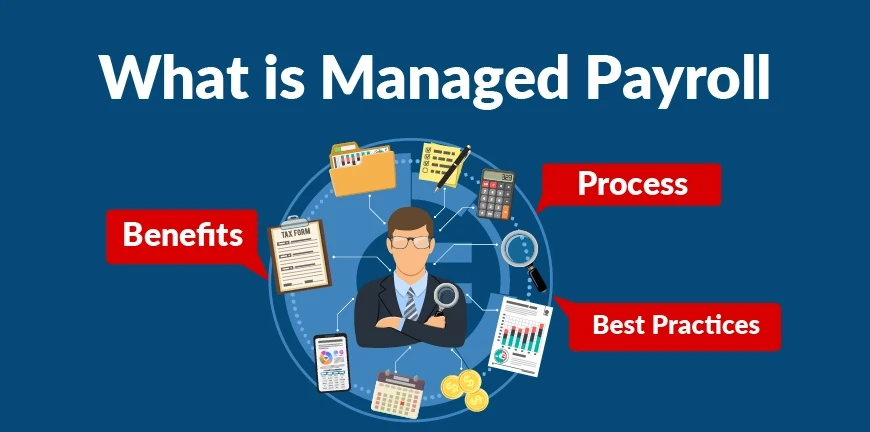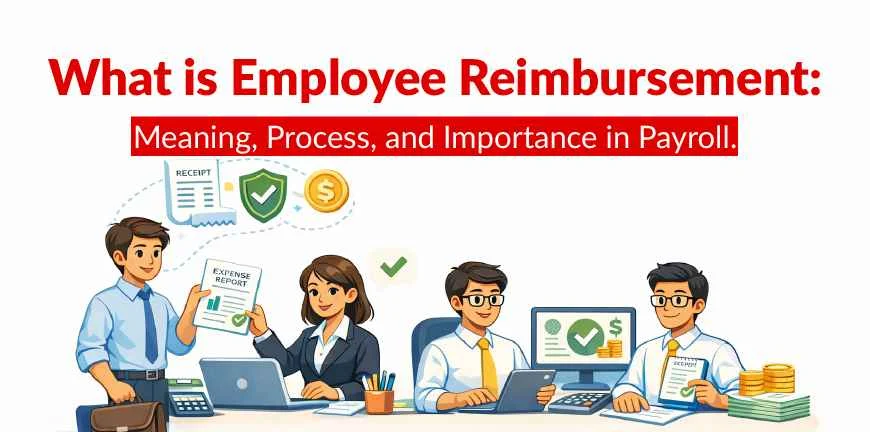
How to Create a Workplace Where Technology and Humans Coexist
07/01/2025
Onshore vs. Offshore RPO: Which Is Better for Your Business?
08/01/2025- Introduction to Managed Payroll
- Understanding Payroll Processing
- Benefits of Managed Payroll Services
- How Managed Payroll Services work?
- Best Practices in Managed Payroll
- Challenges in Payroll Management and How Managed Payroll Solves Them
- Types of Managed Payroll Services
- Key Features to look for in a Managed Payroll Provider
- FAQ- Frequently Asked Questions
Managing payroll is essential part of every business. But the process of payroll can be extremely time consuming and tedious for companies. This is where organizations must think of delegating the task to a third-party expert. Managed payroll services are saving grace for most organizations as it’s a service where the entire payroll process is taken care of by an external service provider.
Introduction to Managed Payroll
Managed Payroll is a payroll service provided by a third-party provider who handles all aspects of payroll processing including calculating wages, administering benefits, withholding taxes and ensuring compliance on behalf of a business. By leveraging managed payroll services, businesses can allow themselves the time to focus on their core business operations while making sure their payroll is processed accurately and on time.
Understanding Payroll Processing
Managed payroll is a concept where an external third-party payroll service provider takes the responsibility of processing your payroll as opposed to the organization managing it in-house. The act of outsourcing the entire payroll processing to a managed services provider is known as managed payroll. The managed services provider takes care of the following aspects of payroll processing-
- setting up your system
- calculation of salaries to be paid to employees
- Ensuring withholding of proper amount of taxes, and benefits
- Ensure compliance with payroll and tax regulations
- Generating payslips for employees’ reference
- Disbursing of payments to employees through direct deposits, cheques or other preferred methods
- Remittances of tax withholdings and other taxes to government bodies
- and filling out any other necessary paperwork.
Benefits of Managed Payroll Services
There are various advantages associated with managed payroll services, right from saving money on in-house costs like buying a software, hiring a dedicated payroll team to the time and peace of mind that comes with hiring an expert third party payroll provider who understand the nuances involved in payroll processing and deliver optimal results. Here are the top 6 benefits
1. Higher accuracy
Expert third party payroll providers have the experience and expertise to handle and manage payroll processing, no matter the challenges and complexities involved. A reliable managed payroll service provider ensures that your organization’s payroll is processed with the highest accuracy and precision.
2. Compliance
Payroll laws and regulations are ever-changing and businesses that already have a lot on their plate can find it hard to keep track of these changes. A third party managed payroll service provider ensures to not just keep themselves updated with changing laws but also helps the client organization maintain compliance with the laws reducing the risk of penalties.
3. Cost Savings
By outsourcing payroll services, companies can save significant costs as they can eliminate the need for an in-house payroll team, reducing administrative costs. Also experienced managed payroll service providers, offer scalable payroll solutions that can be tailored to the unique needs of businesses.
4. Saves time
Processing payroll is an extremely time-consuming task. By outsourcing this tedious, crucial function to a third-party payroll provider, organizations not only save precious time but also can allow themselves the freedom to focus on their core business operations that translate to profitability.
5. Enhanced data security and confidentiality
Managed payroll experts implement strict security measures to protect sensitive employee data including encryption, secure data storage and regular audits to ensure that data remains confidential.
6. Use of advanced modern technology
A reputed, experienced payroll service provider ensures that they make use of modern and advanced technology to handle the processing of payroll of organizations, providing them with access to cutting-edge tools and features that might be cost-prohibitive to implement internally.
How Managed Payroll Services work?
Our managed payroll service includes certain thought-out steps that results in efficient and accurate payroll processing.
1. Payroll setup and integration
Upon engaging with managed payroll services, the third-party service provider starts by initiating integration of your existing systems with their payroll software. This includes sharing of employee data like hours worked, salaries, benefits and more.
2. Processing of payroll
In this step the employer is required to provide us with details like employee work hours, bonuses and compensation details. This is then followed by calculation of wages, deducting taxes and withholdings and then arrive at the net pay which is the actual salary amount disbursed to the employee.
3. Tax filing and compliance
All aspects of tax calculations and filings is handled in managed payroll, while maintaining compliance with local, state and federal laws and regulations. The payroll service provider is responsible for withholding correct taxes and submitting them to tax agencies.
4. Distribution of payments
Once the calculation of payroll is complete, managed payroll service initiates the distribution of payments to employees through their preferred method of payment either by direct deposit or issuance of checks.
5. Record keeping and reporting
The service maintains detailed records of all payroll activities and provides businesses with access to reports and documentation necessary for accounting and compliance purposes.
Best Practices in Managed Payroll
In order to reap the best out of managed payroll here are certain best practices that can be implemented-
- Maintain accurate employee records that include information like their legal names, addresses, tax withholding allowances etc.
- Use a reliable payroll software to streamline payroll processes and ensure the services are secure and accurate.
- Conduction of regular audits of the payroll system is necessary to understand if the process is efficient and effective and are with no loopholes.
- Must implement strong data security measures to protect sensitive employee data and keep it confidential
- Keep yourself updated about the changes in labor laws and regulations and implement the same while calculating wages and withholding taxes.
- Set a consistent payroll schedule
- Keep detailed payroll records
Challenges in Payroll Management and How Managed Payroll Solves Them
Payroll management obviously is quite challenging for organizations to execute with only their in-house team, but managed payroll is the perfect solution to address these challenges. Let’s see how-
1. Issues with compliance
The laws and regulations that govern payroll processing, tax, payment schedules are complex and ever changing. Keeping up with these laws and regulations can be taxing for the in-house payroll and HR team. With managed payroll service, the external provider does not just keep themselves updated with the changing laws but also takes the entire responsibility of maintaining compliance with the same.
2. Security and data confidentiality
While you may think that managing payroll processing in-house makes it easier to secure important information, this isn’t the case often. In this era of technology, securing and protecting data is extremely challenging for in-house teams as they may not have the technology, expertise or manpower to do so. Managed payroll services take care of this problem effectively as they have the technology, expertise and know how to implement robust security measure to protect your data and keep it confidential.
3. Loss of data
Losing payroll data is one of the most common problems that organizations face when they handle payroll in-house. Managed payroll services ensure full backup of your entire payroll data, so you don’t lose valuable information and avoid legal problems in the future.
4. Management of employee data
Keeping employee records and data securely and properly is not an easy feat, especially for in-house teams who already have a lot on their plate. Managed payroll services can take care of this by ensuring that all employee records are stored securely but are also available to the client as and when they need them.
5. Errors in payroll calculations
The risk of miscalculation of wages is much higher when the responsibility is given to the organizations in house team as they may not possess the expertise to do so or have the right tools and software to carry out the task. A managed payroll service provider not just has the expertise but also has the right software that automates the payroll processing ensuring error free calculation.
Types of Managed Payroll Services
There are different types of managed payroll services that are tailored to address distinct needs and preferences of businesses.
1. Fully managed payroll services
In this type of service, the third party managed payroll services provider handles each aspect of payroll processing right from entering of data to payroll reporting. This is ideal for large businesses that are looking to completely take the load off processing payroll.
2. Partially managed payroll services
As the name suggests, only partial payroll services are outsourced to the third-party service providers, the rest is handled by the in-house team, allowing businesses to have control over most aspects of payroll processing.
3. Cloud-based payroll services
Cloud-based managed payroll services leverage online platforms to provide real-time access to payroll data. This type of service offers flexibility and convenience, allowing businesses to access and manage payroll information from anywhere with an internet connection.
Key Features to look for in a Managed Payroll Provider
- Accuracy and Compliance: Managed payroll providers ensure that payroll calculations are accurate and comply with local, state, and federal laws.
- Time and Cost Efficiency: Outsourcing payroll reduces the time and resources spent on payroll processing internally.
- Data Security: Professional payroll providers implement robust security measures to protect sensitive employee information.
FAQ- Frequently Asked Questions
1. What is managed payroll, and how does it differ from in-house payroll management?
Managed payroll is a service that outsources payroll responsibilities to a third-party provider, while in-house payroll management is when a company handles payroll internally.
2. What are the main steps involved in the payroll process?
The main steps involved in payroll processing include- onboarding of employees, defining payroll policy, gathering employee inputs, validation of employee inputs, calculating payroll, accounting, paying salaries, compliance and reporting.
3. What are the best practices for ensuring compliance in payroll processes?
Some of the best practices to implement to ensure compliance while processing payroll are-
- Keep accurate personal records.
- Submit your payroll information on time.
- Manage employee expectations.
- Understand workplace pensions.
- Use audit trails.
- Stay up to date with payroll legislation.
- Understand international legislation.
- Speak to the experts.
4. What are the technological tools used in managed payroll solutions?
Some of the important tools used in managed payroll solutions are- tax management software, time tracking integration, direct deposit, expense management, reporting and analytics and other integration capabilities.
5. What is the role of automation in payroll management?
Payroll automation streamlines tasks like calculating compensation, generating reports ensuring team members receive their salaries. This system reduces manual effort and minimizes errors.
Contact Us For Business Enquiry

Yugandhara V. M
Yugandhara V. M serves as the Assistant Vice President – HRO at Alp Consulting Ltd., bringing over 14 years of rich experience in Human Resource Outsourcing, payroll management, and statutory compliance. He specializes in driving process excellence across HR operations, ensuring seamless service delivery and compliance with labor laws. Yugandhara’s expertise lies in managing large-scale client engagements, optimizing HR processes, and implementing efficient workforce management systems that enhance organizational performance. He also leads comprehensive payroll services, ensuring accuracy, timeliness, and compliance for diverse client portfolios.




